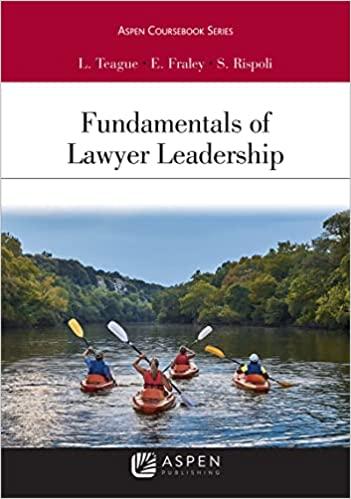Question
X is hiking in the mountains and gets lost. Desperate during the morning to find shelter to escape the cold, X decides to break into
X is hiking in the mountains and gets lost. Desperate during the morning to find shelter to escape the cold, X decides to break into Y's mount cabin, which almost never is used, to escape the cold. X breaks a window so as to enter the cabin. X discovers that the front door is wide open and walks right into the cabin with no effort whatsoever. Is X guilty of common law burglary (consider: intent, time of day, entry, nature of the dwelling)). X while in the cabin spots a valuable computer valued at three thousand dollars. X now opens the closed back door and flees with the computer. Is X guilty of larceny. Explain your answer. Y suddenly appears and chases X and X drops the computer after moving ten feet. X runs an additional 50 feet and Y finally catches up to X and X pushes Y down and escapes. Is X guilty of a robbery based on the Rockmore case in the book? Explain your answer .Y now decides to sell the computer to W and tells W that W is guaranteed absolutely without a doubt to get better grades in the future and likely a perfect GPA with this very special machine, a machine Albert Einstein would have liked to use. X falsely states that the machine has not been used since it was purchased. W does not care whether the machine is old or new, used or unused. W, however, does hope to get better grades. Is Y guilty of false pretenses based on part or all of Y's statement to W. Please be specific in identifying each of the statements that do or do not constitute false pretenses Y changes the amount of money on the check that W paid Y for the computer to read $1,000 rather than $500 although Y loses and never cashes the check. Is Y guilty of a forgery? Of uttering a false check? W discovers that the computer is defective and takes the computer in for repairs. S promises to repair the computer in two weeks and W gives S a check for $100 as a deposit on the repair. S after repairing the computer returns a similar, but older computer to W. W later learns that the computer S gave W actually is worth more money than the computer that W left for repair. Did S embezzle the computer?. In answering this question keep in mind that property offenses typically require both an intent and an act. These offenses typically require a number of elements to be satisfied.
Step by Step Solution
There are 3 Steps involved in it
Step: 1

Get Instant Access to Expert-Tailored Solutions
See step-by-step solutions with expert insights and AI powered tools for academic success
Step: 2

Step: 3

Ace Your Homework with AI
Get the answers you need in no time with our AI-driven, step-by-step assistance
Get Started


